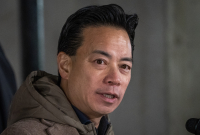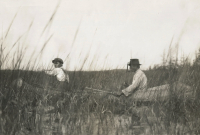Support strong Canadian climate journalism for 2025
Jurors deciding the fate of two men accused of conspiring to murder police at the Coutts, Alta., border crossing were urged by a judge Wednesday to block out background noise in the high-profile case.
Justice David Labrenz told jurors to focus on the evidence.
“Try and reach a just verdict,” Labrenz said in his final instructions in the Court of King's Bench trial.
The jury was then sequestered to reach a verdict in the case of Anthony Olienick and Chris Carbert.
The men were arrested after police confiscated weapons and made arrests in shutting down the blockade in early 2022.
The barricade of vehicles at the Canada-U.S. border crossing choked off traffic for two weeks to protest COVID-19 restrictions and vaccine mandates.
It was one of many demonstrations at the time across the country, as rules aimed at restricting the spread of COVID-19 butted up against individual rights and freedoms.
The Crown presented evidence of guns near the blockade site and statements and text messages from the accused warning that the protest was a last stand against a tyrannical federal government.
The defence argued the two men went to Coutts to make a statement that freedoms must be protected. Court heard comments from the accused disparaging police, but the defence said that doesn’t equate to a conspiracy to kill.
During the trial, jurors heard text messages exchanged among protesters. They called the standoff the "last stand," with one saying they would only go out in a “body bag.”
Along with the conspiracy count, they are also charged with mischief and possession of a weapon for a dangerous purpose. Olienick faces a further charge of being in possession of a pipe bomb.
Labrenz told the jurors that on the most serious charge they have to find evidence of collusion and if so, they have to find that Olienick and Carbert were part of it.
“It is the agreement that is the key,” Labrenz said.
“You’re to decide if there was a conspiracy. If the common purpose is to commit a crime then it is a conspiracy.”
The jurors were to weigh evidence presented over seven weeks in a trial that almost went off the rails just as it was getting going.
Four days into the trial, in early June, jurors parking their cars in front of the courthouse were greeted with a simple message scrawled in chalk on the sidewalk.
The message read: 840 Days Plus Already, Let the Coutts Boys Out of Jail Now.
Two similar messages were left on the other side of the courthouse the day prior.
A British Columbia man was charged with obstruction of justice over the messages and banned from the courthouse.
The scrawls were enough for Carbert’s lawyer, Katherin Beyak, to urge Labrenz to call a mistrial.
Beyak told Labrenz there was a real concern the jurors would blame Carbert for the message, and that this concern could taint their ability to assess the case against him in a fair and unbiased manner.
Labrenz talked to each of the jurors individually and reported back that he was confident they could still be fair and impartial despite the chalk messages.
Labrenz’s comments aligned with the arguments of Crown prosecutor Steven Johnston.
Johnston wondered aloud where would the justice system be if every random statement and chalk scrawl in a high-profile case was given the power to overturn a trial.
“If people in the public feel it's their duty somehow (to be) helping these accused by doing this kind of act, will we just do another mistrial in September?” Johnston said.
Labrenz denied the request for a mistrial, pointing out that one of the jurors said he had already seen a similar message attached to a hay bale on the way to the courthouse.
Fourteen jurors were picked to hear the evidence: 12 eventual panellists and two spares.
Those two spares became one spare over the course of the trial.
Earlier this month, Labrenz dismissed one juror after learning she had been falling asleep during testimony.
A potential juror never made it that far.
When the jury was being selected, he walked into court wearing photos of the accused on his T-shirt. He was excused.
Olienick and Carbert were two of four people charged with conspiracy to commit murder at Coutts.
In February, Christopher Lysak and Jerry Morin pleaded guilty to lesser charges.
Lysak pleaded guilty to possession of a restricted firearm in an unauthorized place. He was sentenced to three years but will not serve more time as he received credit for time spent in pretrial custody.
Morin pleaded guilty to a charge of conspiracy to traffic firearms and was sentenced to more than three years but was also to not serve time due to time spent in pretrial custody.
Both men were also given a weapons prohibition for 10 years.
This report by The Canadian Press was first published July 31, 2024.




Comments